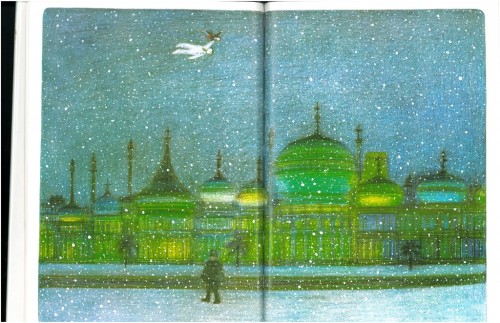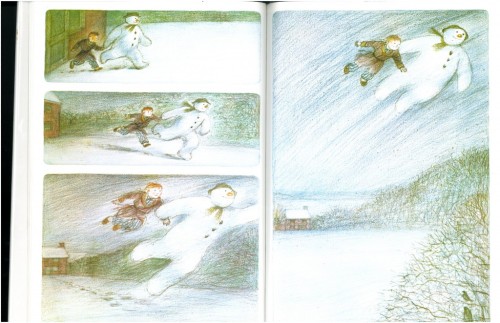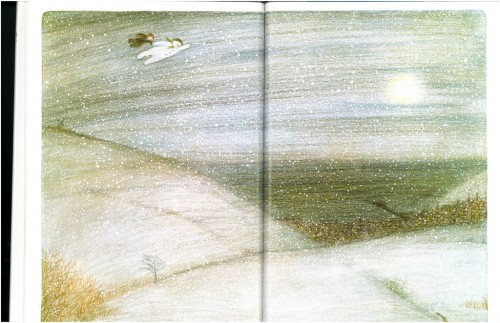Speaking of fragments and the flotsam of a mind working through loss (as I sort of was at the end of my last entry), I had fun looking up this phrase and being reminded it originally came from Robert Frost and not Ponyboy in The Outsiders.
Nature’s first green is gold,
Her hardest hue to hold.
Her early leaf’s a flower;
But only so an hour.
Then leaf subsides to leaf.
So Eden sank to grief,
So dawn goes down to day.
Nothing gold can stay.
The phrase “nothing gold can stay” popped into my mind, however, not as I was thinking of Ponyboy Curtis but of snowmen, and how they always melt. My good friend Blaine recently made me aware of a poignant (and apparently classic) children’s book that perhaps everyone in the world has heard of but me, Raymond Briggs’ The Snowman. Although Blaine warned me that as with most tales involving snowmen this one did not end happily, I have an affinity for snowmen (especially ones that come to life and stuff) and had to check it out. So check it out I did, after briefly waiting for someone to return it to my local branch of the public library. Clutching it in my hands eagerly (the cover was so cute!) I raced back to my office where I “read” it less than ten minutes (scare quotes because one does not read The Snowman; it is a picture book and WOW are the illustrations gorgeous). I can’t believe I never heard of this book! Thematically it is similar to The Velveteen Rabbit, another of my all-time favorite stories. In a nutshell, boy builds snowman, snowman comes to life, boy has magical night of adventure with snowman, boy hugs snowman goodnight, boy wakes up in the bright dawn of a new day to find snowman melted away, only a pile of clothes where he once stood. I started crying even as they were in the middle of their heart-melting magical adventure… maybe because I knew the terrible ending coming, or maybe because the illustrations of them flying hand in hand above the night cityscape were so breathtakingly beautiful, or maybe both. Either way, I had to close my office door because I was crying kind of loudly.

I encourage anyone not familiar with The Snowman to check it out; the tale told in pictures of the blossoming friendship between these two different creatures, boy and snowman, is so sweet, so magical. Their story unfolds quickly and is over too fast, but they packed so much beauty and wonder into that one night. I guess maybe it reminds me of something…of someone.
Blaine had warned me! I knew how this tale was going to end. I sent him a quick message to tell him I was holed up in my office with the door shut, weeping over a storybook snowman, thanks to him (but that seriously I loved the book, thanks for the recommendation! *Sniff*) and his response made me think about how nothing gold can stay, and how snowmen always melt away. I hope he doesn’t mind me quoting him, but I quoted Robert Frost in this post too, so Blaine is in good company, right? Right. He responded:
I hate to think I had something to do with making a dear friend cry but, at the same time, I’m so glad you enjoyed the book! : ) It’s strange but I think the sad ending makes the book even more beautiful, somehow. I mean, if the snowman and the boy (or the velveteen rabbit and his boy – another book near and dear to my heart, btw!) simply lived happily ever after, the books probably wouldn’t bring out the same emotions, you know? Both books seem to tap into something very deep and human within us…and they choke me up, too, but in the best way (as far as tears go).
Hmm. I pondered this all the way home, especially because I, too, love The Velveteen Rabbit. I hate sad endings, or I think I do. But do they make the stories more beautiful? Would The Snowman be as compelling if the title character did not melt at the end? If not, why not? And why am I attracted to stories and images of snowmen? (My thrift score dishes even have smiling snowmen on them.) What does that say about me? Am I a masochist? Etc.! But I think what attracts me is the magic, not the sad ending.
Anyway, Blaine pointing out the obvious-to-anyone-but-me fact that stories featuring snowmen don’t usually have happy endings made me think…and then think some more about this idea that the very thing I hate about them maybe makes them more beautiful. And I think he has a point. They do tap something deep within us (at least us more sensitive souls), but what? I honestly am not attracted to sad endings; I cry enough in regular life and I think there is plenty to feel melancholy about without having to seek out tragedy in my entertainment, you know? (Especially being an animal advocate and knowing the horrible things happening to animals every minute – I actually spend a lot of mental energy studiously avoiding thinking about sad things.) So what’s the deal with snowmen, and with stories about toys coming to life only to become real and leave us, a la The Velveteen Rabbit? I guess the obvious interpretation is they are sort of a metaphor for the human condition. The only constant is change, everything is impermanent, blah blah. It sounds cliche to me now, but wrapping my head around the salience of impermanence was one of the greatest challenges for me in the early stages of mourning Alec.
Or maybe it’s that when we love deeply with our entire being, we create something new. The relationship becomes a living thing, we create a new entity, we bring something to life, like magic! But that is a bit too abstract; it’s not what attracts me. What always appealed to me (an imaginative child with lots of stuffed animals and imaginary friends) so deeply in the story of the velveteen rabbit was this utterly romantic idea that if you loved something/someone enough you could literally bring it/them to life. And an extension of this magical thinking would be if you loved someone enough you could keep them from dying, right? I didn’t realize some part of me believed this until Alec got sick, and it made losing him harder, though it’s difficult to put gradations on that experience. I blame the fairy tales! Though I guess I can’t really, because they contain both messages: love can bring someone (your snowman, stuffed bunny, etc.), to life, but they always melt in the end (or in the case of the velveteen rabbit, leave). Yet I guess somewhere deep down I really, truly believed my love could keep him alive, not literally (maybe literally), but that’s what it felt like, you know? How could I lose him when I loved him so much?
My love couldn’t keep him here, though. He melted away. But we really flew for awhile. And maybe I’m not the boy in these stories. Maybe I am the snowman, the velveteen rabbit — my love for Alec brought me to life. I recall my friend Mike saying, during one of our many conversations when I was in the initial, noisier and messier, throes of grief, something about how knowing our time with our loved ones is finite makes it more beautiful somehow (and especially in the case of those of us who love dogs, we’re just asking for it since their average life spans are so much shorter). I could be making that up but I am pretty sure he said almost exactly the same thing as Blaine, but rather than referring to stories about snowmen and such he was talking about real life. I thought that was horseshit. I wanted Alec back, that was all. I knew our time together was beautiful. I knew it every day. But I wanted him to grow old. I wanted more time.
But nothing gold can stay. And as with the boy and the snowman in the story, Alec and I packed a lot of life, love, and happiness into our seven years together. Although it wasn’t much of a comfort at the time, I knew this when he was sick: our relationship was so rich, so full of joy and gratitude (on my end – I certainly can’t speak for him!), that we had packed more good stuff into our lives together than many relationships that last much longer. It didn’t make losing him any easier. But as I reflect — as the loss becomes less immediate, making reflection actually possible — I do see the beauty, the magic in it.
Although sometimes I wonder if I made it all up, you know? He’s not here anymore to verify what I once knew so assuredly. It’s just me. Just like the guy in that Weakerthans song who sees Bigfoot and nobody believes him. What does he say? “But the visions that I see believe in me.” I always liked that line. So at the end of my pondering, I have concluded what I like about these stories is the magic, the sense of wonder and possibility, not the sad ending. And that’s okay. Just as it’s okay for others to like, or at least appreciate, the sad endings. It is a fair question — does brevity make things more beautiful? — but as for me I probably would have honestly been just as happy if the snowman and the boy kept having their magical rendezvous every night until the end of their days. But there it is. There is always an end. One night, 30 nights, seven years. I loved Alec before he was mine. To me it was magic not only that we met and connected, but that I got to adopt him at all. Without hyperbole I can say that being able to bring him home, finally, was the fulfillment of the dearest wish I have ever held. There is magic in that…in our wishes coming true, in connecting so strongly with another in this life, whether they be human or nonhuman. I hoped there would be magic in our separation, that I could keep him with me somehow. And who knows?
When I was little I used to play a game called Stuffed Animal Town. I would build a miniature town out of books and have my stuffed animals walk around and do things and talk to one another. Besides reading, it was one of my favorite pastimes and I could get lost in pretending for hours. One of my ex-boyfriends used to tease me when I would go off on my occasional flights of fancy (ahem, not that I do that a lot or anything) by saying I had gone to “stuffed animal town.” I always thought that was funny. But the thing is since an early age I have been imaginative and had a fondness for stories about magical friends and stuff. It is a childish trait that part of me never left behind, which is why these stories are so dear to me. And now I have a real someone to project all of this fanciful stuff onto – Alec! I wrote in my last post that it was a leap for a skeptic like me to decide that Alec and I could never be separated and that he would always be with me (my #1 coping mechanism).But as I ponder, perhaps Stuffed Animal Town is my “religion” and therefore it’s not as big a leap as would first appear. I have always wanted the world to be enchanted, from a young age. I grew up and out of it to an extent (let’s hope so!) but part of me will always be back there playing Stuffed Animal Town and arranging my stuffed animals on the bed so the blanket doesn’t suffocate them while I’m out. I guess that’s part of who I am. And I guess also it’s obvious why these stories speak to me. They are like the ultimate wish fulfillment for someone like me, whereas a more normal person may interpret them, well differently. I don’t have a good conclusion here. Sometimes it’s just good to ponder, and wander. And wonder.
Musical postscript: The theme songs for this post are Bigfoot! by the Weakerthans and “Abominable Snowman in the Market” by Jonathan Richmond and the Modern Lovers. Enjoy.



My friend Blaine wrote an awesome response to this post in an email. With his permission I wanted to excerpt it here because it stirred up a lot of additional thoughts and feelings in me, which I’m sure will make their way into a post soon!
So here is Blaine:
That was too good not to share. Thanks Blaine!